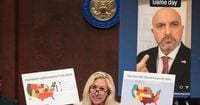On Thursday, May 8, 2025, the Republican-led House of Representatives passed a controversial bill to rename the Gulf of Mexico as the "Gulf of America," a move that seeks to codify an executive order signed by former President Donald Trump. The legislation, sponsored by Rep. Marjorie Taylor Greene, R-Ga., passed narrowly with a vote of 211 to 206, with all Democrats opposing the measure and only one Republican, Rep. Don Bacon of Nebraska, breaking ranks to vote against it.
The bill aims to formalize Trump's directive from his first day in office, which instructed federal agencies to update all documents and maps to reflect the name change within 180 days of enactment. Greene, a staunch Trump ally, argued that the renaming is not just a matter of semantics but a patriotic obligation. "The American people deserve pride in their country and they deserve pride in the waters that we own, that we protect with our military and our Coast Guard," she stated during the floor debate.
However, the bill has faced significant backlash from Democrats, who have labeled it as a waste of time and resources. Rep. Mary Gay Scanlon, D-Pa., called it "may be the dumbest bill brought to the floor during the six years I’ve served in Congress," emphasizing that Congress should focus on more pressing issues. Similarly, Rep. Jared Huffman, D-Calif., criticized the measure as "deeply unserious," arguing that it does absolutely nothing to help the Gulf Coast or address the climate crisis.
In response to the bill's passage, House Minority Leader Hakeem Jeffries condemned the Republican majority for prioritizing this legislation over more pressing matters such as healthcare, the economy, and national security. He questioned why Congress was devoting time to renaming a body of water when there are significant challenges facing the American people.
Despite the House's approval, the bill's future in the Senate remains uncertain. Senate Majority Leader John Thune, R-S.D., has not committed to bringing the measure to a vote, indicating that the Senate has other priorities at the moment. To pass, the bill would require bipartisan support, including at least seven Democrats to overcome a procedural hurdle.
Critics of the bill have pointed out that the name change, while significant for some, does not have the support of the majority of Americans. A February poll conducted by Marquette University revealed that 71 percent of respondents opposed renaming the Gulf of Mexico. Additionally, opponents have raised concerns about the financial implications of the name change, suggesting that the costs of updating maps, textbooks, and other materials could exceed the Congressional Budget Office's estimate of less than $500,000 over five years.
Rep. Val Hoyle, D-Ore., argued that the name change would ultimately burden taxpayers, stating, "Who is going to pay for the maps, for the books, for the signs that municipalities, schools, and libraries have to replace? We do as taxpayers."
Amidst the legislative debate, Greene has accused Democrats of being in league with Mexican cartels, suggesting that their opposition to the name change stems from a desire to maintain ties with criminal organizations. This rhetoric has drawn criticism from both sides of the aisle, with some Republicans expressing discomfort at the inflammatory nature of her claims.
As the bill moves forward, it highlights a growing divide within the Republican Party itself. Bacon's opposition to the measure, calling it "juvenile," reflects a faction of the party that is wary of Trump's influence and the direction he is steering the GOP. His comments about the bill sounding "sophomore" in nature resonate with a segment of the electorate that is looking for more substantive legislative efforts.
In addition to the Gulf of America bill, Trump has also indicated plans to rename the Persian Gulf to the Arabian Gulf during an upcoming trip to the Middle East, further emphasizing his administration's focus on rebranding geographic locations. This move has sparked additional controversy, particularly among those who view it as an attempt to erase historical identities.
The White House has been actively promoting the Gulf of America name change, even going so far as to restrict access to Associated Press journalists who did not adhere to the new terminology. This led to a legal challenge, resulting in a federal judge ordering the administration to restore access to AP reporters, highlighting the contentious relationship between the press and the Trump administration.
As the bill heads to the Senate, it remains to be seen whether it will gain the necessary support to become law. The deep partisan divide and the contentious nature of the proposal suggest that it may face significant hurdles in the upper chamber. The outcome will likely reflect broader themes of nationalism, identity, and the legacy of the Trump administration as it continues to shape American politics.
In the meantime, Greene and her supporters are rallying to defend the bill, arguing that it is a necessary step toward asserting American sovereignty over its waters. Whether or not the Gulf of America will become a permanent fixture in U.S. law remains uncertain, but the debate surrounding it is sure to continue as both sides prepare for the next legislative battle.






